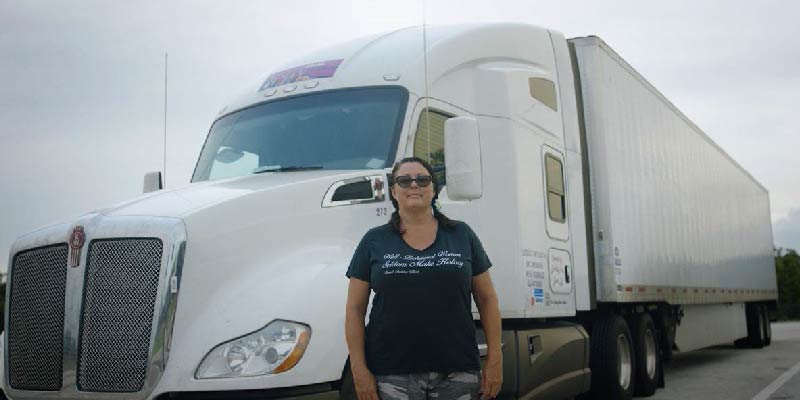This spring, the Department of Labor joined the Biden-Harris administration’s 90-Day Trucking Apprenticeship Challenge to promote the apprenticeship model as a solution to connect more well-trained drivers with good-paying jobs. While the trucking industry has many good jobs, the risk of sexual harassment and sexual assault keep too many women from the field. We spoke with Desiree Wood, the founder and President of REAL Women in Trucking, about her experience in the trucking industry. REAL Women in Trucking was formed in 2010 as a protest group by women professional truck drivers seeking to improve work conditions in the industry. The following are edited excerpts from the interview.

1. What drew you to the trucking industry? What do you like about the job?
I was looking for a job after my kids had grown up and moved out where I would be valued for my work ethic and see the country. I was attracted to the movement and trucking felt like a purposeful occupation. I felt like I was really contributing to society by being part of the supply chain.
2. How has workplace sexual harassment or sexual assault affected you?
I have experienced sexual harassment in other work environments, but it is much different in trucking. In those early months of training when I knew little about the industry, I was isolated for weeks at a time on an 18-wheeler with someone my company led me to believe that I could trust, far from any familiar places. I was afraid for my life with several individuals my company placed me on trucks with to learn after an experience where the driving instructor I was supposed to trust became abusive as soon as we left the terminal.
3. What challenges do women in the trucking industry face related to sexual harassment and assault? How does that impact them?
Workplace sexual harassment and sexual assault affects how you can perform your job and function in all aspects of your life. Your earning capacity has an immediate impact, and this can have repercussions in all other areas of your life. In trucking, it affects highway safety since you cannot focus on being a safe driver when you are being terrorized, harassed or afraid you will be sexually assaulted by your trainer or co-driver. Sexual violence is impacting the retention of women who wish to become truck drivers but are falling through the cracks because of the abuse they encounter in the first few critical months in the industry.
4. What supports are available for women who encounter sexual harassment and assault?
Organizations like REAL Women in Trucking or the S.H.E. Trucking community are available to help support women who encounter sexual assault and sexual harassment, including by referring them to a lawyer. Unfortunately, too many women do not know about us until they have already been harmed and want to put it all behind them. Many just leave the industry and never look back even though they would have made great truck drivers.
5. What could employers do to create a safer, more welcoming environment for women who want to enter the trucking industry?
Employers should not be using students of any gender in team driving. Trainers should be sitting up front and supervising the trainee to teach them, not be sleeping in back to prepare to drive a second shift. There should be conduct training implemented with situational videos just like trucking companies use for inclement weather driver training. Sexual harassment training should be comprehensive and hold grave consequences for violating policies. Women should not be the ones who lose their ability to earn a living when they experience sexual assault, violence or harassment. Nor should they lose income because they choose to wait for a female trainer.
6. What industry change would you like to see?
One of the most important changes I would like to see is for drivers who perpetrate sexual violence have their commercial driver licenses revoked. I also hope to see emergency blue light boxes with cameras installed at truck stops, which could improve safety and deter violence and harassment. Admitting there is a problem is the first step to improving culture. I urge companies to step up and to learn about this important topic that affects the retention of women entering truck driver training.

 U.S. Department of Labor Blog
U.S. Department of Labor Blog